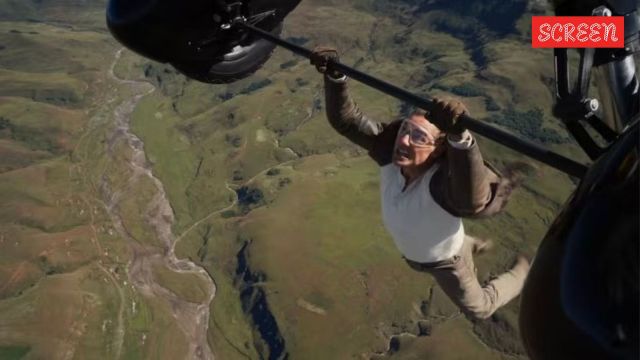Click for more updates and latest Hollywood News along with Bollywood and Entertainment updates. Also get latest news and top headlines from India and around the World at The Indian Express.
Mission: Impossible – The Final Reckoning, in all its exhaustive and bloated messiness, stands as a tribute to the myth of Tom Cruise
Mission: Impossible – The Final Reckoning, in an unusual meta stroke, reveals what the franchise has always truly been: a man against the impossible, called upon only when the world, and the story itself, has run out of options.
 If one looks beyond the surface level, it is actually Tom Cruise waging war against the very forces hollowing out modern cinema.
If one looks beyond the surface level, it is actually Tom Cruise waging war against the very forces hollowing out modern cinema.The greatest line ever delivered in the 29-year run of the Mission: Impossible franchise is not spoken by Ethan Hunt. But it is, unmistakably, about him. It is delivered by an antagonist in the fifth installment, Rogue Nation. And it cuts clean through the myth with utmost precision: “Ethan Hunt is a gambler. And one day, his luck will run out.” It’s not just a line. It’s a manifesto. A razor-sharp summation of Hunt’s ethos, his instinct to leap where others hesitate, to risk everything in pursuit of something greater. The line lingers because it speaks the unspeakable: that behind every impossible mission lies the possibility of final failure. That even Hunt, the man who outruns death, may one day miscalculate. And nowhere does this truth echo louder than in The Final Reckoning, the franchise’s supposed swan song. The film doesn’t just build on that line, it breathes through it. At several points, we see it reflected in the eyes of those around him: some waiting, almost willing, for his luck to falter. Others quietly astonished that it hasn’t. Many, too many, whispering, hoping, wishing him luck. Because in the end, that’s all he’s ever had. Luck.
Look across all his missions, every plan, every fancy gadget, and what remains, when the dust settles, is a man locked in combat with fortune itself. Not the enemy, not the ticking clock but luck. History remembers the outcomes, but if you look closely, you’ll see: Hunt has failed more often than he’s succeeded. His strategies have unravelled more times than they’ve prevailed. He’s risked too much, for too long, and too often with nothing but a whisper of a chance. In the end, he improvises more than he plans. He moves forward not with certainty, but with faith. Faith that somehow, he’ll pull it off. He tells himself this. Sometimes he says it aloud. And now, in the final installment, another character speaks it for him. At a critical moment, someone turns and says, “He’ll figure it out.” That’s it. That’s Hunt. Not the greatest spy the world has ever known but a man chasing greatness with endless devotion. Not infallible, not unbreakable. Just relentless. Like any of us, he’s simply trying to do the job better than the day before. And, like all of us, somehow ending up in deeper trouble than the last time.
What’s even more fascinating, over the years, across installments and one death-defying stunt after another is how the myth of Hunt has slowly camouflaged itself within the legend of the man who plays him: Tom Cruise. At this point, it no longer matters whether Cruise is playing Hunt, or if Hunt is simply trying to live up to Cruise. Both are locked in a singular devotion. One saves the world. The other, the movies. Neither stops until everything has been given. And the world: chaotic, cynical, ungrateful, keeps pushing them down, only to come running back when it needs saving. Again and again. So it’s fitting that The Final Reckoning, in all its messiness, in all its metaness, stands as a tribute to their commitment.
Because just look at the text of The Final Reckoning itself. It’s bloated. Exhaustive. Incoherent. Overstuffed with exposition. The setup feels endless, the conversations spiral, flashbacks interrupt, characters arrive mid-sentence, and every ten minutes a new narrative thread is introduced. Hunt is flung from one helicopter to another, from one interrogation room to the next, and as an audience, you wait, for coherence, for momentum, for resolution. But maybe that is the point. Maybe the film is no longer just telling a story, but reflecting the exhaustion of the myth it carries. The chaos, the repetition, the weight, it mirrors the burden of being Hunt. Of being Cruise. The endless planning, the ceaseless globe-trotting, the constant recalibrating from gadget to gadget, ally to enemy, mission to mission. And then, at some point, all the noise fades. It comes down to one man, again, against everything. Hunt/Cruise must read the room, feel the moment, and run. Not just toward the next mission, but against the weight of fate, the end of a franchise, the collapse of the world that refuses to hold together without him. Because that’s what he does. That’s all he’s ever done.
View this post on Instagram
And in that sense, we arrive at what may be the film’s, and perhaps the franchise’s greatest set-piece. For nearly thirty minutes, Hunt is underwater, alone, searching for a lost submarine beneath the Arctic. No backup. No voice in his ear. Just him, the cold vastness, and the clock. It’s cinema at its purest. Action filmmaking devoid of noise and gimmickry, delivered with genuine composure and assuredness under the direction of Christopher McQuarrie. For the first time in the film, the tension is visible, the stakes heightened. It feels earned. It feels inevitable. Because this is where it was always meant to go. It’s a meta-stroke, a reveal of what the franchise has always truly been: a man against the impossible, called upon only when the world, and the story itself has run out of options.
And fittingly, at this moment, all the wizardry fails. The tech betrays him. Hunt is left with nothing but breath, instinct, and luck. Just as Cruise, in that same stretch of cinematic silence, finds himself up against a film that keeps trying to outthink him. Even more fitting, perhaps slyly poetic is that a franchise built from the beginning on technical wizardry, latex masks, retinal scanners, and voice modulators, now finds itself locked in combat with a rogue artificial intelligence. The ultimate trickster turned threat. It’s subversive, even subtextual. On screen, it’s Hunt chasing a sentient algorithm. Beneath the frame, it’s Cruise waging war against the very forces hollowing out modern cinema. This isn’t just a mission to stop an AI. It’s a mission to preserve the purity of storytelling itself. Against green screens, digital doubles, synthetic stakes, face storytelling. Here is a man doing the impossible for real. Risking life and limb to give audiences a reason to come back. A blockbuster not just for profit, but to keep the lights on, for theatres, for studios, for arthouse films yet unmade. For a shared dream we call cinema.
It’s only heart-breaking, then, that this time, perhaps, luck has finally betrayed them. It’s painful to watch them in a film that spirals in circles, never realising that the franchise’s true magic was never in the twists, but in the run. It’s even more painful to see both Hunt and Cruise spend long stretches unsure of what to do or how to do it. Most painful of all is seeing them caught in a story that calls on them too late and asks too little. But maybe this, too, was inevitable. For all Hunt’s desperate sprints away from fate, maybe this was always how it would end. At some point, it had to catch up. After all, not every mission can be completed. Not every story can be saved. Some are beyond rescue. But then again… we know these men. They don’t stop. They won’t. They do it for those they’ve never met. And maybe, most of all, they do it for themselves. Because the true mission was never out there. It was within. A battle against themselves. Against the creeping doubt that they are no longer enough. That the world has moved on. That their moment has passed. So no, it’s not them asking us to believe them one last time. It’s them, asking themselves to believe. One more time. Even after luck runs out. Because for them, it’s never the end.


- 01
- 02
- 03
- 04
- 05
































